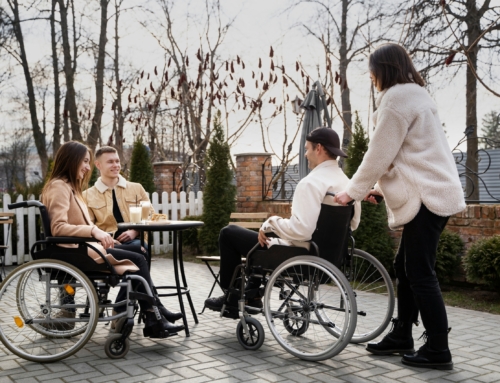Rediscovering “Accessibility as Hospitality” by Erinn Oxford. Originally posted at erinnoxford.com, Erinn explores the profound connection between accessibility and hospitality. Join us in amplifying Erinn’s insights as we extend the conversation on accessibility and hospitality within the Disability and Faith community, powered by Karis Disability Services.
It was an accessible restaurant for a couple of years. Dion and I would occasionally go, entering through a door that was both wide and street-level. One day we arrived to notice that the door was locked. I went around to the other side of building to discover that they had reconfigured the space. Now the only entrance was up three large steps. “But look!” the manager said, “The door is at least automatic”. I asked if there was any way they could let us in the other door. The answer was a hard no. “We can help him walk up the steps!” To which I said, “my husband cannot transfer out of his wheelchair. There is no walking up the steps. Do you realize that you have made a once accessible place into the opposite?” I felt enraged on Dion’s behalf.
This is but one of many stories that could be told about the general lack of accessibility in our society. My own awareness of it was heightened when my mother became quadriplegic, with some very limited use of her right hand. Between that, Dion’s journey with Multiple Sclerosis, and the many people in my community at The Dale who require mobility supports of various kinds, my learning has expanded. This does not mean that I completely understand how it feels to experience accessibility limitations- I would never dare to claim that I do. It does mean that my eyes are open, and I feel the challenge to make accessibility a priority. It is, in my opinion, a matter of hospitality.
My greatest teachers in this are the ones who have to navigate obstacles every single day. I have learned that the swing of a door matters, as does the placement of an automatic door button; that one step is too many; that sometimes the only way a person can manage to drink out of a cup is with a straw; that support animals are life-changing; that the height of sinks and toilets and counters can be prohibitive to some people; that not being able to participate in events because you can’t get in is heartbreaking.
Buildings of all kinds have not been designed to be inclusive. I’m also very aware of the cost that is involved in making a space accessible. We had to build a ramp for my mom. And then when Dion required a new level of care, we had to renovate our home. We could not have made that happen without the financial support of our community. Our connections afforded us a certain privilege. I reflect on this a lot. What I long for is our experience to be replicated for everyone.
I imagine that an important way forward is to have anything new designed for all. I recently read about how the remote control was invented for people with limited mobility, and now is a convenience for all. Similarly, SMS text messaging was first created for people who are deaf and is now a preferred method of communication. It is so easy to take those two things for granted but imagine what they mean for someone who lacks mobility or can’t talk on the phone. Accessibility for all concerns and impacts every aspect of life.
As I walked out of that restaurant I mentioned, I was followed by one of its employees. With tears in her eyes, she explained we weren’t the first to mention the issue of the entrance and that she would be sure to talk to the manager. Seeing someone not be able to get in humanized the issue for that person. It was no longer just a door, but an obstacle. I hope that for her, and for her manager the experience will bring about tangible change.
I often think about the Biblical story of the paralyzed person who was lowered from the roof by his friends in order to see Jesus. I desire to be that kind of friend. It also reminds me that our bodies are not static. What we need today might be different tomorrow. For me, it has started with asking: for people to get around freely and in autonomy, how can we all contribute to and conceive a world that’s accessible to them and ultimately to all?

About the Author:
Erinn Oxford was born and raised in Toronto, works in Parkdale, in the city’s west-end. Erinn is passionate about building a community in which all people are welcome and where those who experience poverty are valued. Erinn is a Christ-follower, a mother to Cate, a partner to Dion, a musician and lover of all the arts, a self-confessed klutz and an aspiring friend to many.
You can find Erinn online at erinnoxford.com.



